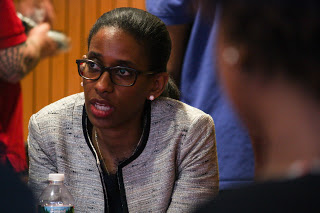- Public Policy
- Leadership
- Funding
- News & Events
- About the Center
Back to Top Nav
Back to Top Nav
Back to Top Nav
Back to Top Nav

Binta Brown, a partner practicing corporate law at Kirkland & Ellis LLP, has noticed the growing gap between entrepreneurship and the obligation to help mankind. She believes that market solutions and business models can be harnessed to address humanitarian crises, and that private institutions have a responsibility for addressing public problems. A member of the Council on Foreign Relations and a Truman National Security Fellow, her work has included advocating on behalf of women and girls, assisting with democratic institution-building and rule-of-law reforms, and engaging in other human rights matters throughout the world. Before presenting her talk, “Private Answers to Public Challenges,” Courtney Wong '15 sat down with Binta Brown for a brief interview.
Courtney Wong (CW): What motivated you to pursue a career in law and social justice?
Binta Brown (BB): I was greatly influenced by the civil rights movement. I'm really part of the first generation of living in the United States without the barriers of legalized segregation and the pernicious racism that kept people from realizing the fullness and wholeness of their humanity. And so I was always very aware, perhaps because my parents were from the Deep South, that the life I was getting to lead was because of changes in the law and because people made certain sacrifices to realize those changes.
CW: So why not pursue civil rights work?
BB: I think that the great benefit and luxury was that I didn't have to do civil rights work because a lot of that work had already been done. Once the barriers came down, it was up to me to live my life with integrity and in a way that remains committed to social justice and fighting the new fights, as to opposed to fighting the old fights.
I have also always loved business, even from when I was a young girl. I had my lemonade stand and my Girl Scout cookies, and I loved executing marketing strategy. But overall, my life has been about doing what needed to be done and how to make the world better. When I was an undergraduate, I did a lot of different internships and tried a bunch of things out, but I was always committed to doing something for the betterment of society.
CW: What can motivate my generation to "fight the new fights"?
BB: I hope what will inspire you all is that there is so much work to be done. Not to get involved would be to have a sense of complacency that suggests you are not aware to the extent of how much things have gone wrong. There is an obligation and a burden that comes with the extraordinary education that you are receiving here, and it compels you to do something with the state of the world. Particularly in this day and age with globalization and the amplifying effects of the internet, you would really have to have your head down to have no clue of what's going on and what needs to be changed. To ignore that would be to not appreciate what you've been given.